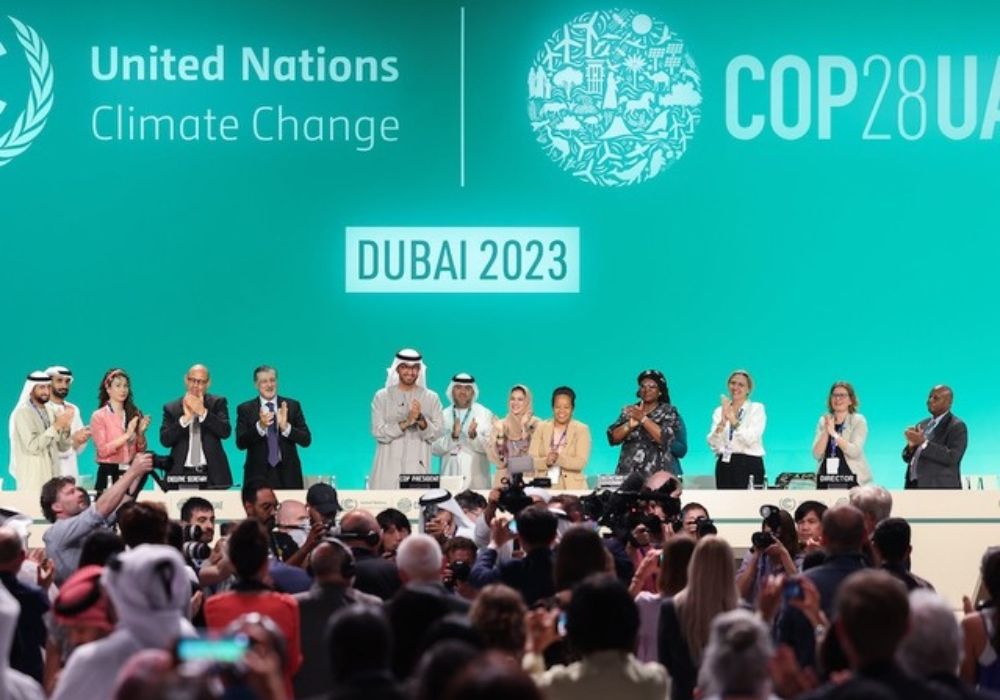A flawed but still transformative COP28 declaration signalled a transition out of fossil fuels and the dawn of renewable energy as United Nations climate negotiations concluded in Dubai, United Arab Emirates around noon local time today.The COP28 decision text, released Wednesday morning, included language about “transitioning away from fossil fuels in energy systems” and “reducing both consumption and production of fossil fuels in a just, orderly and equitable manner so as to achieve net zero by, or before, or around 2050 in keeping with the science”.
The historic provisions, arrived at after round-the-clock negotiations by climate ministers and other senior officials, appeared in the energy transition section of the 21-page document. “A call to transition energy systems away from fossil fuels—the first time oil and gas had been included in a COP agreement—won over those demanding strong action; but oil producers and developing countries were reassured by assertions that countries are free to follow their own paths to net zero,” Bloomberg News reports.
“Taken together with a call to triple renewables deployment, [take] action on methane emissions, and get a loss and damage fund going, Dubai may well be the most significant COP since the Paris Agreement in 2015.” Initial analysis indicated the surrounding language was about as weak as it could be in the constellation of United Nations legal jargon, with phrasing that merely “calls on” countries to take action rather than pushing for it in stronger terms.
But it was still a major advance over an earlier draft, published Monday by the COP28 Presidency, that was dismissed as “unacceptable”, “incoherent”, “grossly insufficient”, and a “slap in the face” by angry, frustrated, and increasingly sleep-deprived delegates.
Ultimately, the final deal “could amount to a historic agreement as it addresses the impacts of polluting and harmful energy sources, and shapes a path towards energies that are safer and more reliable,” said Canadian Environment and Climate Minister Steven Guilbeault, who played a lead role in the talks. “The package is not perfect; no UN text is. But as someone who has been in this space for more than 20 years, I see a vision we can rally around.”
“What matters is the message this sends out to potential fossil fuel investors,” Climate Home News reporter Joe Lo wrote on social media. “In the previous text, you couldn’t say that governments had agreed to transition away from fossil fuels. Now I think you can.”“It is an enhanced, balanced—but make no mistake—historic package to accelerate climate action,” COP28 President Sultan Al Jaber said after delegates accepted the deal.
But in the closing moments of the COP, the Alliance of Small Island States (AOSIS) warned that major concessions in the final text would impede action in a crucial decade for climate action. While the final text “is an improvement and does indeed reflect a number of submissions made by small island developing states,” it “sputters in significant areas” and keeps the door open to expand fossil fuel production. With “a litany of loopholes,” AOSIS added, the final COP decision “is incremental and not transformational.”
‘First nail in the coffin’ for fossil fuels
COP observers pointed to a breakthrough moment in the history of international climate negotiations, while remaining clear-eyed about the hard work ahead.
“For the first time, the move away from fossil fuels is explicitly stated in a COP outcome—a first nail in the coffin for the fossil fuel industry,” said COP veteran Bill Hare of Climate Analytics. While “oil and gas producers squeezed in unhelpful language, pretending gas can be a transition fuel, or that carbon capture can clean up after them,” he said, “these small battle wins for the industry are bitter and hollow, and ultimately won’t win the war. Loopholes and false solutions can only serve to delay their inevitable demise, yet it’s clear from the text—which is strongly committed to the 1.5°C warming limit—that there’s not time to lose.”
“COP28 marks the beginning of the end of the fossil fuel era,” said Linda Kalcher, executive director of the EU’s Strategic Perspectives. “This outcome must be harnessed by governments and markets, but clearly signals the beginning of the end for coal, oil, and gas in the global economy and the massive growth of renewables.”
“Countries have agreed a path to address the gaps in global climate action: transition away from fossil fuels, deliver on global targets on adaptation, and take new steps to scale up finance for climate action, critically setting up a new loss and damage fund,” said Alex Scott, program lead at the E3G climate think tank. “There are gaps—especially on finance for adaptation—and loopholes—but the ultimate direction of travel is clear: the fossil fuel era is ending.”
Now, Scott added ,”the proof will be in the delivery—in countries’ next climate plans due by 2025, and in the transformation of the wider finance system to deliver the economic shifts needed. “
Observers pointed out there was no agreement on how the transition out of fossil fuels will be funded in the poorest, most vulnerable countries on the front lines of the climate emergency. Those factors, along with the ultimately weak language on fossil fuels, made COP28 a “fossil-fuelled failure,” declared the Center for International Economic Law.
“Countries at COP28 faced a choice between fossil fuels and life. And big polluters chose fossil fuels,” said Nikki Reisch, director of CIEL’s climate and energy program. “Despite the unstoppable momentum and unequivocal science behind the need for a clear signal on the phaseout of oil, gas, and coal—free of loopholes or limitations—the text failed to deliver one. This failure was 30 years in the making, borne of a process that allows a select few countries to hold progress hostage and the fossil fuel industry not just to sit at the table, but to play host. Survival cannot depend on lowest-common-denominator outcomes.”
“Wealthy countries like Canada and the United States—who have an overwhelming responsibility to phase out fossil fuels first and fastest—have failed the global community by refusing to provide the financial support needed from developing countries in order to transition their economies away from fossil fuels, adapt to the impacts of the climate crisis, and address the losses and damages being experienced,” said Julia Levin, associate director, national climate at Environmental Defence Canada. “Rebuilding trust will require wealthy countries to start paying up so that no one is left behind.”
“People on the front line of the climate crisis have little to celebrate from this disappointing COP,” said Chiara Liguori, senior climate change policy advisor at Oxfam International. “Rich countries with historical responsibilities for the climate crisis, like the UK, needed to do much more. No money was put on the table to help developing countries transition to renewable energies. And rich countries again reneged on their obligations to help people being hit by climate breakdown who are left facing more debt and worsening inequality.”
Tough conversations about filling in missing dollars for the new loss and damage fund, funding climate change adaptation, delivering a fair and equitable transition out of the fossil fuel economy, ending fossil fuel subsidies, and tackling structural inequities in international debt arrangements—all essential cornerstones of the fight against climate change—will continue in the lead-up to COP negotiations in Azerbaijan and Brazil in 2024 and 2025.
How a deal was done
Earlier, officials were working through the night in Dubai, United Arab Emirates, apparently closing in on a deal that would salvage two weeks of COP28 negotiations with compromise language pointing toward a phaseout of fossil fuels.
After the overwhelming response galvanized by the original decision text, “there’s been a change in tone at the COP28 climate summit in Dubai,” Bloomberg News reported. “The shift was suddenly palpable late Tuesday as top negotiators from Japan, Canada, Norway, UK, and the U.S. rallied together outside.” U.S. climate envoy John Kerry was grinning, and “within an hour, ministers were coming out again, describing progress in bridging a deep divide over the future of fossil fuels and plans for a new draft text in the early hours of the morning.”
COP28 CEO Adnan Amin told Bloomberg negotiators were on the cusp of a deal, Kerry said the discussions were “moving in the right direction,” and Canadian Environment and Climate Minister Steven Guilbeault said the emerging decision would “keep 1.5C within reach. I leave the meeting encouraged. Much more than yesterday.”
Bloomberg said it had seen a working draft of the eventual compromise text “that would call on nations to swiftly transition away from using fossil fuels,” while “steering clear of polarizing promises to ‘phase out’ fossil fuels that had drawn fire from Saudi Arabia and other oil-producing nations.” At that stage, the text was “more declarative than an earlier version released Monday evening, which didn’t commit countries to specific steps such as tripling renewable power and boosting efficiency.”
Crucially, Bloomberg recalled, the Monday draft referred only to steps countries “could” take to drive down emissions and speed up the energy transition. The new draft said nations “should” take those steps, a small shift in nuance that made a big difference in what one veteran COP observer had been calling “UN-speak”.
As overnight gave way to early morning in Dubai, there was some indication that discussion might have turned to the always-contentious area of international climate finance, though those essential details remained unaddressed as the COP concluded.
“Developing nations have long expressed frustration that the U.S. and other wealthy countries have not offered more aid to help them weather climate-fuelled disasters. Some poorer countries are also dependent on their fossil fuel reserves to boost national wealth, meaning a deal to phase out those fuels would slash their income,” Politico wrote. “Additional aid could be a carrot to persuade some holdouts to agree to the tougher language on the production and burning of coal, oil, and natural gas, by far the biggest sources of climate pollution.”
Guilbeault told media that wealthy nations “all recognize we need to do more when it comes to financing,” Politico said.
But negotiators from China, India, and other countries said they would not accept language on a fossil fuel phaseout or phasedown, Politico added.
“To tell us to stop fossil fuels is an insult. It’s like you are telling Uganda to stay in poverty,” the country’s minister of energy and mineral development, Ruth Nankabirwa, said on social media. Uganda would be open to “a long-term phaseout”, she added, but only if “developing nations can exploit their resources in the near term, while wealthy longtime producers quit first.”
This story first appeared in The Energy Mix. Read the original article here.







